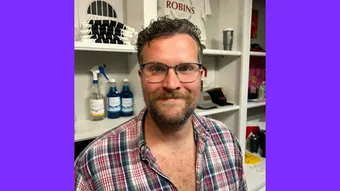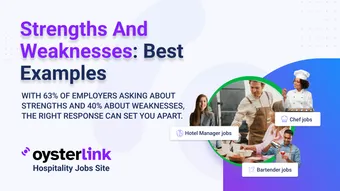Who is Carolina Franco?
Carolina Franco is a Human Resource Director for Renaissance Hotels. Renaissance Hotels are owned by Marriott. You will be surprised to discover that Carolina is somewhat of a Marriott baby. She comes from a hospitality family, but she initially didn’t plan to follow in the family steps. Carolina worked hard and got a degree in medical billing and coding. She pursued a hospitality management degree later and started working her way up in the hospitality industry. She has over a decade of hospitality experience.
Carolina Franco discovers all the top secretes to get hired! Don’t miss out, watch the interview now.
How To Land a Hospitality Job and Progress to a Management Role
During a Saturday dinner rush while dealing with demanding customers, it is difficult to imagine yourself sitting in an office in Times Square overlooking one of the most iconic sceneries and managing a team. Believe it or not, this is one of the most common scenarios for any individual that decided to pursue a hospitality career.
Bryan Holland, a NYC Restaurant General Manager spoke about the opportunities that the hospitality industry offers to the ones that stick around long enough. In today’s interview we decided to ask Carolina Franco, an HR about the best ways to land a hospitality job and progress to a management position.
With over ten years of experience in the hospitality industry, Carolina shared all her tips and tricks for job seekers and new hiring managers.
What inspired you to join the hospitality industry?
Carolina Franco: I consider myself a Marriott baby, because my mom has been working with them for over 25 years now. I grew up in the hotel setting and realized it was amazing to see everything from the inside and be a part of it. However, I didn’t think I would end up in the same line of work as my mother, but I am excited and happy that I did.
Hospitality is a great industry. If you want to succeed it offers amazing opportunities to learn and grow. It helps you open doors to different departments until you find your true calling.
My mother currently works at Siant Regies as a Senior Operations Manager. She started her career as a Housekeeper and worked her way up. She is my biggest role model and my motivation. My goal is to be better than her, and I keep telling her this.
After realizing that hospitality is where I want to be, I started my career in Marriot. Over the years I have been working for Hayat and Hilton. I started as a Front Desk Agent, took care of opening a Courtyard in Chelse and I worked my way up into operations.
Every hotel has something special, and each role was a wonderful experience. I am currently leading the human resource department at Renaissance NYC.
How to land the first hospitality job?
Carolina Franco: Landing your first hospitality role is not very challenging. Of course, it all depends on what you want to do and where you want to start.
Speaking from an HR perspective, what I look for, especially for a Front Desk Agent, are customer service skills. If you are applying for a Night Auditor position, banking experience would be your biggest advantage. I also pay attention to your previous experience, and how long you held your previous position.
One thing people often forget in this industry but is extremely important is the resume. That is what will set you apart from other candidates. Your resume is your ticket from the desk applications to an interview.
Keep your resume to one page, but make sure that on that piece of paper you list as many relevant details as possible. You can use a template, such as the ones available on Canva. It helps break up the text and it makes the life of the recruiter much easier in understanding what type of person you are based on your resume.
Resume templates can assist you in many ways. They help condense the information but also give enough for a great understanding of the person’s competencies. Every job seeker should know this by now, but the golden rule in job search is to tailor your resume to each job. The easiest way to impress a recruiter and stand out from the crowd is to insert four lines of things that you've done and, in the skills section, mention every relevant skill.
How important is a cover letter?
Carolina Franco: Laughs. Well, you understand that I belong to the new generation of recruiters, right? A while ago cover letters were a key component of every job application. Now, I am not going to say they are not good, they are, but I also want to be transparent.
Every time I get a cover letter I skim through it. I would rather look at the resume in front of me and try to understand the person behind the piece of paper, based on the qualities, accomplishments and skill they used in their resume. While reading the resume I make sure that the information provided is accurate.
A part of our culture is to ask for references.
In the name of transparency know that it’s a great move to have a reference included! It is so nice and helpful to hear about the potential candidate from another person’s perspective. When you hear how amazing they did in their previous role, there is no better feeling.
The interview is a way to get to know this person you liked from their resume and their references. It’s a great way to connect to the person you already created a mental picture of. To make this short and easy to digest – I would always choose references over a cover letter.
Dress to impress, yes, or no?
Carolina Franco: I love this question. I believe that a polished look is a very important thing.
When you dress to impress, it shows you want the job you applied for. It gives an impression of a person that wants to be there. The way you present yourself and you put yourself is extremely important, because the hiring manager knows only your resume but not your personality. So, you need to show that you care.
But it’s not only about what you are wearing, but about how you talk, body language, and how you hold yourself during the interview.
I prefer to keep the interview closer to an informal conversation, to make the candidates feel more comfortable, but that is not your cue to slouch on the chair. While the conversation is moving forward, I am taking notes about you, so get used to it, and don’t let it distract you.
Don’t forget about eye contact! It is extremely important. The eyes they don’t lie chico. You can see in the person’s eye if they are genuine and true to themselves and the position they are applying for.
Before I forget, you can’t forget it, the handshake tells a lot about the person. If you are not sure, go practice with friends and family.
What is your go-to question during an interview?
Carolina Franco: You are asking me to give away all my secrets, just kidding. I have several things I normally ask during an interview, and several methods that will be useful to hiring managers.
Let’s start with my absolute favorite question: “How would a friend/manager describe you?”
The answer to this question tells me a lot about how they perceive themselves and what their confidence level is. If you combine this answer with the references, it’s almost a guarantee you won’t make a mistake. This might be the most helpful question.
When it comes to the interview methods, I tell new hiring managers and recruiters to use the STAR method. This is something any HR professional should always have in their mind.
STAR is a behavioral-based interview questions and it stands for:
- Situation
- Task
- Action
- Response
This will help a hiring manager understand problem solving skills, perspective, and people skills. If the candidate manages to hit all the four letters you can consider you had a great interview and you have an amazing candidate in front of you.
One thing that I do is ask candidates is their feedback on the interview and if there was anything they could have said better or would change.
The last but equally important thing is to provide feedback post-interview to the candidate. If you are in human resources for more than the paycheck you clearly care about helping people and improving their skills.
So even if it didn’t work out with you and your establishment, you can inform them why and help them prepare for the next interview and land a job somewhere else. Only because it wasn’t a good fit for your establishment, it doesn’t mean it won’t be a great match for another establishment.
Helping people improve is one of the best feelings ever.
How difficult is it to find a good candidate?
Carolina Franco: Finding a good candidate really depends on where the job is posted. A lot of people apply just to see what's out there, which adds to the challenge. I have a coordinator on my team, and together we review around 80 resumes a day, especially for entry-level positions.
It’s a little bit more challenging for a Director of Operations or Hotel Manager role. For those, we go through about 30 to 40 resumes a day. We focus on their experience and how long they've stayed in previous jobs, because we want someone committed to staying long-term. It is challenging to choose between experiences and decide who might be a better culture fit based on the resume. That’s why interviews are so important.
We also look at their growth. If I can help someone become a better manager or move forward in their career, I’m here to mentor them. Career development is something I really value. This is what human resources should be about, helping people improve. I can’t stress this enough.
What is your take on career breaks and less than a six-month commitment?
Carolina Franco: I promised I would be transparent, so for me a candidate should have a minimum of six months in every job and position they had.
Sometimes you get a great candidate with an almost perfect resume, and then you see a big career break or a short-term position. The way I approach it is I always give them a short call to clarify any doubts before I call them for an in-person interview.
If the culture of the previous employer wasn’t a good fit, or the person had personal things they needed to take care of – you absolutely can’t hold that against them! As a hiring manager you need to understand and accept that we are all human at the end of the day.
The essence of a hiring manager's job is to give everybody a fair chance and equal opportunity, all the bias and prejudice has to go out of the window.
What is a realistic career progression path in hospitality?
Carolina Franco: In the hospitality industry, career progression takes time and experience. When I started as a Front Desk Agent, I received my first promotion within two years. That’s a realistic timeline for entry-level roles, like front desk agents or Food and Beverage staff, to move up to an Operations roles.
What’s important is gaining exposure to different departments. For example, you might start at the Front Desk, but after seeing how things work in Housekeeping, you might realize you prefer that path and choose to grow there. It’s about being open to where your interests and strengths lead you.
For someone just starting, I’d say it usually takes about 2-3 years to get your first promotion. To reach higher levels like department head or director, it’s more realistic to expect about five years of solid experience, with strong performance, of course.
Fresh out of school helps, but practical experience is key to climbing the ladder.
How can candidates know if an establishment is good or bad?
Carolina Franco: To filter out good workplaces from bad, I recommend starting with research. Check surveys and reviews from employees or customers—these can give you insights into how the place operates. If there have been any issues, they’ll likely show up there.
Beyond that, pay attention to how you feel when you walk in for the interview. The environment says a lot. If the front desk staff doesn’t greet you or seems uninterested, that’s often a red flag. On the other hand, if people are welcoming and you feel a positive energy, it’s a good sign. When the manager interviewing you is friendly and engaged, it usually means the company values its culture.
One question I get asked often is, "What’s the company culture like?" At my current workplace, we focus on a "loves culture." We celebrate diversity, inclusion, and community service. We also hold regular town halls to include everyone’s input. If a company takes time to talk about culture and include employees in important conversations, that’s a green flag—it shows they care about their people.
All things hospitality from Renaissance Hotels HR Director, Carolina Franco
Carolina’s answer to the question: “What is the one thing you wish you knew before you started out in hospitality?” might surprise you.
She didn’t talk about tips she wished she knew; her answer was simple. Carolina wished she started out earlier. According to Carolina, and some other interviewees like Selim Soliman, the hospitality industry is the only industry that offers so many career paths and progression.
In the hospitality industry you can start as a Server, transfer to a Receptions just to realize that you would much rather stay away from people and go to the back of the house as a Housekeeper and progress to the director position within two years. It sounds amazing, right? So, what are you waiting for? Check out the open positions today and start applying.






Loading comments...